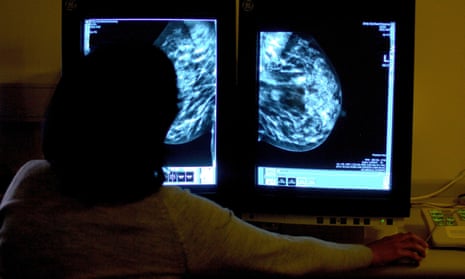A drug described as one of the most important advances in treating breast cancer in the past 20 years is to be given to women in the UK for free while the medicines regulator decides whether it should be available on the NHS.
The National Institute for Health and Care Excellence’s provisional decision in February that palbociclib should not be routinely funded on the NHS in England was decried by patients but its final appraisal has been paused for the drug manufacturer Pfizer to present further clinical data.
In the meantime, Pfizer has said it will make palbociclib available free of charge. The drug in combination with another can stall the growth of the cancer for about 10 months in comparison with existing treatments.
Fiona Hazell, director of policy and engagement at the charity Breast Cancer Now, said: “This is an unexpected lifeline for thousands of women living with this type of breast cancer. We are delighted that Pfizer have listened to our campaigners and have found a way to enable patients to access this first-in-class drug in the short term.
“While only an interim measure, more than 16 women every day could have their lives changed by this drug during this window. Palbociclib can offer a large proportion of patients with incurable metastatic breast cancer significant extra time before their disease progresses – time that can be truly invaluable to them and their loved ones.”
She said anyone who thought they might be eligible should speak to their doctor, but also urged Nice to reach agreement with Pfizer on making it available on the NHS to anyone who needed it.
At the time of the draft guidance that recommended palbociclib be rejected, Dr Nicholas Turner, team leader in molecular oncology at the Institute of Cancer Research and consultant medical oncologist at the Royal Marsden in London, described the drug as “one of the most important advances in treating the most common type of breast cancer in 20 years”.
The ICR and Breast Cancer Now both urged Pfizer to reduce the price to allow it to be offered on the NHS. Nice said at the time that a full course of treatment would cost £79,560 and the benefits were “still not enough to make palbociclib cost effective at its current price”.
It estimated that about 5,500 people in England – out of 45,000 new diagnoses of breast cancer each year – would potentially be eligible for treatment with the drug.
Results of a trial in 666 women with advanced breast cancer, presented at the American Society of Clinical Oncology meeting in Chicago last June, showed that taking palbociclib in combination with letrozole increased progression-free survival for a median 24.8 months compared with 14.5 months for letrozole alone.
The free programme is expected to be open for a maximum of five months – closing six weeks after Nice issues final guidance on the drug, or on 30 September, whichever is earlier – with access being dependent on individual NHS trusts signing up to the scheme.
Pfizer said women who took up the offer would receive the full duration of treatment, regardless of Nice’s final decision.
A spokeswoman for the company said: “Pfizer believes women with metastatic breast cancer deserve access as soon as possible to this innovative medicine that has been shown to significantly increase progression-free survival.
“Acknowledging calls from physicians and patient groups across the UK for timely access to palbociclib, Pfizer has made the decision, in this instance, to provide palbociclib free of charge whilst the appraisal process continues.”










